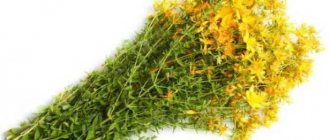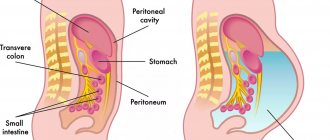Green tea for gastritis
Traditional consumption of green tea for gastritis is allowed only during the period of remission. The rule applies to diseases affecting the digestive organs.
In the subacute stage of gastritis, when restoring the mucous membrane, drinking the drink is useful. This is due to the high content of beneficial microelements and vitamins. They have a pronounced regenerative effect on the epithelium of the gastric mucosa. Remember, when treating subacute gastritis, you will need to brew green tea in a special way.
Gastritis in a patient
Green tea recipe for gastritis
- Three tablespoons of loose green leaf are poured into a saucepan and filled to the top with hot water. Not with boiling water.
- Leave to sit for half an hour.
- The saucepan is placed in the bathhouse and continues to simmer for 30 minutes.
- The resulting drink is cooled to a comfortable temperature. For gastritis, you are allowed to drink 2 teaspoons every 2 hours throughout the day.
If you brew and consume green tea according to the given recipe, the drink will become an effective remedy for the digestive canal. Treatment with this method prevents relapses of gastritis and other diseases of the gastrointestinal tract.
Mechanism of action of the drink
The main therapeutic effect of green tea on the stomach is to reduce the inflammatory process. If you drink the drink regularly, it will help improve the condition of the digestive tract and prevent exacerbation of diseases - nonspecific colitis, neoplasms in the lumen of the large intestine.
When answering the question whether green tea or another variety is useful for gastritis, it should be mentioned that drinking black tea, even with the addition of milk, during exacerbation of gastritis is strictly contraindicated. The above applies to all varieties of Chinese Pu-erh.
The beneficial effects of green tea
According to scientific and clinical studies, regular consumption of green tea stimulates the digestive process.
- The drink contains caffeine, which helps reduce body weight.
- Tea polyphenols help accelerate metabolic processes.
- Drinking freshly brewed green tea with meals helps in rapid absorption and assimilation.
- Drinking the drink in the morning will help you successfully fight flatulence and bloating. Reducing gas formation leads to a decrease in intestinal bloating and reduces pain.
Popular recipes
During gastritis, you can brew drinks that contain only one component - tea leaves. Another option is to supplement the main ingredient with some herbs that have a positive effect on the gastrointestinal tract. Many patients prefer to vary these recipes: one day they brew only tea leaves, and on the second day they prepare an herbal mixture.
Recipe 1
This is the simplest way to prepare a flavorful drink that has numerous beneficial properties. For preparation you will need:
- 350 or 400 ml of hot water - it is important to take not boiling water, but slightly cooled water;
- 3 tbsp. l. green leaf tea.
Preparation can be divided into several stages:
- Mix hot water and dry leaves in a container. The liquid should remain under the closed lid for at least 20-30 minutes.
- After infusion, the container is placed in a water bath and heated for another 25 minutes.
- The broth is left covered to cool.
- After straining, you can drink the drink little by little throughout the day. Be sure to take the infusion in small sips.
Recipe 2
In addition to tea, this recipe contains mint. In this case, it is better to use fresh leaves, since after drying some of the beneficial components will be lost. Have to take:
- 30 g of tea leaves - it is not recommended to use more, so that the drink does not become strong;
- mint leaves (3-4 pcs.);
- 350-400 ml hot water.
Tea prepared according to recipe No. 1 is poured into a thermos after a water bath. Place mint leaves there and cover tightly with a lid. The decoction brewed in this way must steep for at least 20 minutes. Drink the finished drink a quarter glass 3 times a day. The duration of treatment should not exceed 7-10 days. After a short break, tea can be prepared again.
When is green tea contraindicated?
Green tea has a number of undeniable advantages, but has a number of contraindications. Chronic gastritis is considered an insidious disease; without timely treatment, it can degenerate into a malignant neoplasm. You should not self-medicate. Only a doctor allows a certain product or drink.
Before resorting to traditional medicine recipes, it is strongly recommended to consult a doctor and check the approved variety for stomach diseases. Like any herbal decoction, brewed tea leaves have a number of serious contraindications.
Side effects of green tea include:
- Increased heart rate.
- The appearance of an attack of angina pectoris.
- Increased irritability and uncontrollable nervousness.
It is not recommended for women to drink green tea during pregnancy and breastfeeding. Tea can interact with medications; it is better to consult a nutritionist before taking it.
Tea for gastritis with high acidity
The effect of tea on the inflamed gastric mucosa leads to a decrease in the inflammatory process or, on the contrary, increased pain. To avoid such troubles, you should stop drinking tea, especially black. Even when drinking natural black tea for gastritis, it is easy to harm the gastric mucosa.
Strongly brewed black tea is strictly contraindicated for acute gastritis with a high level of acidity. The drink has an extremely aggressive effect on the mucous membrane of the gastrointestinal tract and can provoke an exacerbation of gastritis or ulcers. The substances contained in tea have a stimulating effect on the nervous system, which will negatively affect the condition of the gastric mucosa.
Useful properties of a natural product
The silky taste and softness of a properly prepared green drink speak in favor of a positive answer to the question - is it possible to have tea for gastritis? Its healing properties are numerous and have long been adopted by traditional and scientific medicine:
- high concentration of vitamin C - one cup contains an amount equal to the vitamin content in four oranges;
- tonic effect - wise residents of the East have long noticed the peculiarity of invigorating and setting in a positive mood;
- Metabolism is accelerated due to caffeine, allowing the body to burn unnecessary fat faster;
- the presence of antioxidants helps slow down aging and enhance the ability to regenerate tissue and skin;
- toxins and harmful deposits are not retained in the body and are eliminated quickly and effectively, improving blood quality;
- mucous membranes are restored and, under the protective influence, are less damaged;
- immunity works better due to the presence of vitamins A, P, K, B;
- Calcium, potassium, iodine and fluorine in the composition help in the prevention of serious diseases.
The rich chemical composition - alkaloids, amino acids, organic acids - has a beneficial effect on health. Therefore, the drink is recommended for cancer prevention and daily maintenance of alertness.
Medicinal herbal teas
Patients often wonder whether it is permissible to replace tea with medicinal preparations for gastritis.
Herbal mixture for erosive gastritis
Herbal tea allows you to quickly heal wounds and erosions on the mucous membrane of the digestive canal. To prepare, take 2 parts of coltsfoot flowers and 1 part of marigold flowers. Take 1 teaspoon from the resulting mixture and brew with a glass of boiling water. When the tea is infused, it can be consumed as a drink up to 5 times a day. The general course of treatment is one month.
Tea that contains calamus root, calamus root, peony root, chamomile, mint herb, etc. is good for gastritis.
Herbal tea for atrophic gastritis
To treat atrophic gastritis, it is useful to drink tea from marigold flowers, shepherd's purse and St. John's wort. It is better to infuse herbal teas in a thermos. Take 1 glass daily. To increase the taste and therapeutic effect, it’s a good idea to add a couple of spoons of natural honey to your tea.
Koporye infusion
This remedy for gastritis with high acidity has long been actively used in folk medicine. Making tea is easy. Take dry Ivan tea in an amount of 30 grams and pour half a liter of boiling water. Boil the tea for 5 minutes and steep for an hour. Take half a glass before meals.
Anise tea
If you believe the latest research by scientists, anise has a valuable ability to have a detrimental effect on the causative agent of gastritis and ulcers - Helicobacter pylori. It is thanks to the microorganism that the inflammatory process develops in the stomach. Modern gastroenterology strongly recommends that patients with gastritis include anise tea in their daily diet. With the help of the drink, you can quickly eliminate spasms of smooth muscles and relieve severe pain.
To make tea you will need anise seeds. Place a teaspoon of seeds in a thermos and pour a glass of boiling water. Infuse the drink for 2 hours. Peppermint tea is also useful for gastritis.
Green tea consumption and the risk of stomach cancer
Introduction Gastric cancer (GC) ranks fourth in the structure of all cancer diseases and is one of the main causes of death from malignant neoplasms. In 2011, there were 989,600 new cases of GC worldwide and 738,000 deaths among patients diagnosed with the disease in 2008. In terms of the number of new cases detected, the world leaders are South Korea, South American countries, Japan and China, which may be determined by environmental factors and lifestyle.
Research in this area shows that excessive consumption of protein, animal fat, salt and meat increases the risk of developing stomach cancer, while eating foods rich in fiber, including vegetables, fruits and soy in the diet acts as a protective factor for the development of gastric cancer. . Green tea, being one of the most consumed drinks in the world, contains a large amount of polyphenols, the main of which are flavonoids. Currently, about 4,000 flavonoids are known, of which catechin is the main component of green tea. Over the past decade, several clinical studies have been conducted that provide conflicting results about the effect of green tea components on the risk of developing GC.
Purpose of the review
To evaluate the effect of green tea consumption on the risk of gastric cancer.
Materials and methods
The review included 17 epidemiological studies conducted in Asian countries (10 case-control studies and 7 cohort studies) published from 1988 to 2010 and identified by searching PubMed (Medline), American University of Health Science's literature database EBSCOHOST and Google Scholar .
conclusions
Of the 17 epidemiological studies, 8 found no association between green tea consumption and the risk of developing cancer, 8 showed an inverse association, and only one study showed a reduction in the risk of developing cancer with green tea consumption. An analysis of the research results showed that to date no significant association has been found between reducing the risk of developing cancer and drinking green tea, which requires additional research in this area.
Comments
Green tea contains a large amount of polyphenols, which are powerful antioxidants. The most important of these is epigallocatechin-3-gallate (EGCG). Based on in vitro studies using human tumor cells and in vivo animal studies, EGCG has been shown to have anticarcinogenic effects by altering a wide range of signaling pathways such as mitogen-activated protein kinases, activator of transcription Janus kinase, phosphoinositide 3-kinase /protein kinase B, etc.
In animals, EGCG has been shown to block the development of tumor diseases such as cancer of the lung, skin, esophagus, bladder, breast and prostate, and colon.
However, the above population study did not prove a significant connection between drinking green tea and reducing the risk of developing gastric cancer, which does not currently give the right to classify the components of green tea as protective factors for gastric cancer.
Why is it that GC is most often diagnosed in Asian countries? One of the main justifications for this is the high infection rate of H. Pylori in Asian countries, so in Japan over the age of 50 years it reaches 70-80% [1], and in China it ranges from 58 to 81% depending on the region of residence [2, 3].
The second most important argument is tobacco smoking. In Japan, in recent decades, a large number of meta-analyses and systematic reviews have been carried out, which have proven a significant association between nicotine consumption and the risk of developing cancer (RR=1.8 (95% CI: 1.5-2.1) for men and 1.2 (95% CI: 1.1 -1.4) for women) [4]. According to the results of a population-based study conducted in Japan, it was shown that approximately 28.4% of GC are associated with tobacco smoking [5]. Similar results have been demonstrated in studies in China. Thus, a prospective study showed that the relative risk (RR) was 1.4 for regular smokers [6]. A prospective study among males in Shanghai showed that the risk of developing cancer among smokers was 80% higher than among non-smoking men [7].
The third important argument is the large amount of salt consumed in the countries of the Asian region. This was demonstrated in meta-analyses conducted in Japan, according to which the relative risk of developing gastric cancer ranged from 2.2 to 5.4 when consuming high amounts of salt [8]. In China, an analysis of 45 case-control studies and 11 cohort studies found that eating a large amount of salted fish, salted vegetables and salted soybeans is one of the risk factors for the development of GC (RR=1.1 -2.6) [8].
In connection with all of the above arguments, dietary recommendations have now been developed in Japan and China, such as reducing the consumption of salt and nitrosamines in food, increasing the consumption of vegetables and fruits, which are aimed at reducing the risk of developing GC in the region.
Literature:
- M Inoue, S Tsugane. Epidemiology of gastric cancer in Japan. Postgrad Med J 2005;81:419-424 doi:10.1136/pgmj.2004.029330.
- Shi R, Xu S, Zhang H, Ding Y, Sun G, Huang X, Chen X, Li X, Yan Z, Zhang G. Prevalence and risk factors for Helicobacter pylori infection in Chinese populations. Helicobacter. 2008;13:157–165.
- Zhang DH, Zhou LY, Lin SR, Ding SG, Huang YH, Gu F, Zhang L, Li Y, Cui RL, Meng LM, et al. Epidemiology of Helicobacter pylori infection in Shandong and Beijing areas. Zhonghua Neike Zazhi. 2009;48:1004–1007.
- Koizumi Y, Tsubono Y, Nakaya N, Kuriyama S, Shibuya D, Matsuoka H, Tsuji I. Cigarette smoking and the risk of gastric cancer: a pooled analysis of two prospective studies in Japan. Int J Cancer. 2004;112:1049–1055.
- Shikata K, Doi Y, Yonemoto K, Arima H, Ninomiya T, Kubo M, Tanizaki Y, Matsumoto T, Iida M, Kiyohara Y. Population-based prospective study of the combined influence of cigarette smoking and Helicobacter pylori infection on gastric cancer incidence : the Hisayama Study. Am J Epidemiol. 2008;168:1409–1415.
- Tran GD, Sun XD, Abnet CC, Fan JH, Dawsey SM, Dong ZW, Mark SD, Qiao YL, Taylor PR. Prospective study of risk factors for esophageal and gastric cancers in the Linxian general population trial cohort in China. Int J Cancer. 2005;113:456–463.
- Moy KA, Fan Y, Wang R, Gao YT, Yu MC, Yuan JM. Alcohol and tobacco use in relation to gastric cancer: a prospective study of men in Shanghai, China. Cancer Epidemiol Biomarkers Prev. 2010;19:2287–2297.
- Wang XQ, Terry PD, Yan H. Review of salt consumption and stomach cancer risk: epidemiological and biological evidence. World J Gastroenterol. 2009;15:2204–2213.
Source: I-Chun Hou, Saral Amarnani, Mok T Chong and Anupam Bishayee. Green tea and the risk of gastric cancer: Epidemiological evidence. World J Gastroenterol. 2013 June 28; 19(24): 3713-3722.








